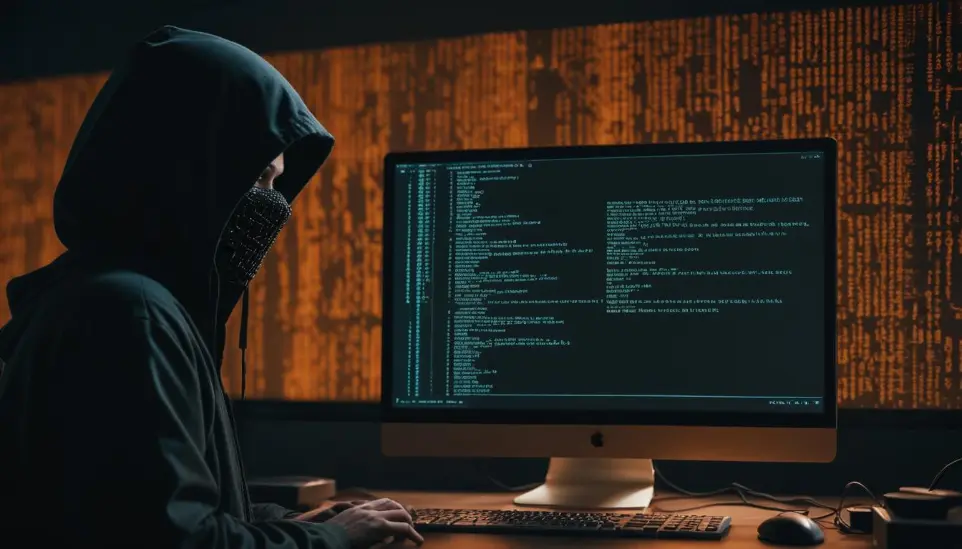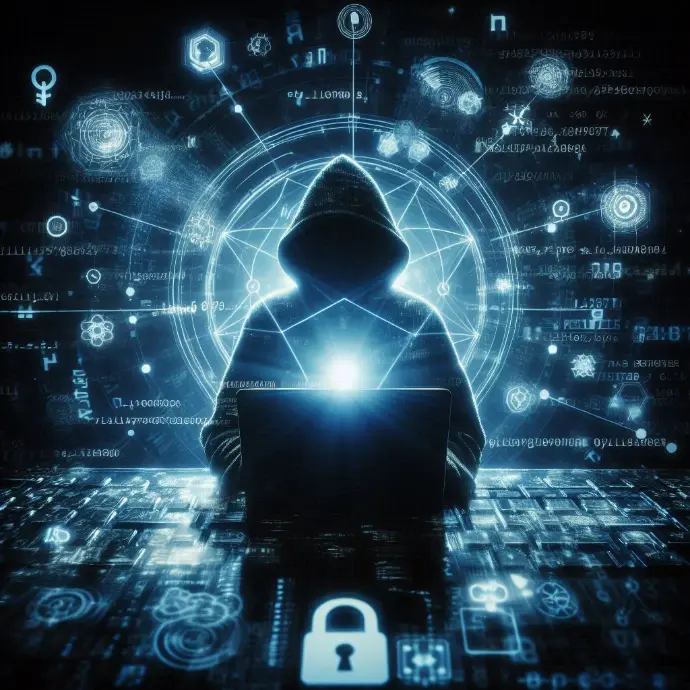In our main article, "The Dark Web, the Dark Side of the Internet," we delve into the mysterious and controversial world of the Dark Web, unraveling the risks and benefits that this enigmatic part of the internet offers. Are you ready to discover what lurks in the depths of the web? Read on and prepare for a fascinating experience.
Introduction to the Dark Web
The Dark Web, also known as the Dark Web, is a hidden part of the internet that cannot be accessed through conventional web browsers. It is characterized by its anonymity and lack of regulation, making it fertile ground for illicit activities and illegal transactions.
Unlike the surface web, the Dark Web is not indexed by standard search engines and requires specific software, such as Tor, to access. This encrypted and uncensored environment has generated significant interest, both for its potential benefits and significant risks.
The Dark Web is a virtual space that hosts a variety of content, from anonymous discussion forums to drug and weapons markets.
The lack of regulation and oversight has led to this area being perceived as a haven for illegal and criminal activities, posing significant challenges for cybersecurity and society at large.
Accessing the Dark Web raises numerous ethical, legal, and security questions, as its anonymous and unmonitored nature makes it fertile ground for criminal activity. However, cases have also been identified where the Dark Web has served as a means for legitimate political dissent, secure communication, and privacy protection in repressive environments.
The Dark Web is a complex concept that sparks ongoing debate about its uses, risks, and benefits, making it a highly relevant topic in the field of cybersecurity and emerging technology.
History and Evolution of the Dark Web
Accessing the Dark Web safely is crucial due to the potential risks involved in exploring this unindexed side of the internet. One of the most common ways to access the Dark Web safely is through virtual private networks (VPNs). A VPN masks a user's IP address and encrypts their traffic, helping to protect their identity and privacy when browsing the Dark Web.
In addition to using a VPN, it is important for users to access the Dark Web using specialized browsers, such as Tor (The Onion Router). Tor is a browser specifically designed to allow users to anonymously access the Dark Web. By routing through a network of servers distributed around the world, Tor hides a user's location and online activity, providing an additional level of security when exploring the Dark Web.
Another critical step to accessing the Dark Web safely is to keep your software up to date. Both the Tor Browser and any additional security software should always be updated to protect against potential vulnerabilities. Additionally, users are strongly advised to avoid downloading files or clicking on unknown links while browsing the Dark Web, as these may contain malware or links to malicious websites.
Risks and Benefits of the Dark Web
The Dark Web presents several significant risks, one of the most prominent being the ease with which illegal activities can be carried out, such as the sale of drugs, weapons, stolen personal data, and other illicit items. This lack of regulation and anonymity has also led to the proliferation of criminal activities, such as child exploitation, human trafficking, and cybercrime in general.
Furthermore, the Dark Web is a breeding ground for cyberattacks, the theft of confidential information, and access to illegal services, such as hiring hackers to commit cybercrimes. The lack of oversight and the difficulty in tracking perpetrators make it a particularly dangerous environment for users and organizations.
Finally, the Dark Web also poses a threat to national security, as it can serve as a haven for extremist groups, terrorists, and cybercriminals seeking to evade detection and covertly coordinate their activities.
Although the Dark Web is primarily known for its negative aspects, there are also cases in which it has been used for beneficial purposes. For example, in repressive environments, the Dark Web has provided a means for political dissidents and journalists to communicate and share information safely, avoiding government censorship and repression.
Furthermore, in the field of cybersecurity, the Dark Web has been a space where researchers have been able to monitor and gather information on potential threats, software vulnerabilities, and online criminal activity, which has contributed to the improvement of cyber defenses and the prevention of cyberattacks.
Furthermore, for certain marginalized groups, such as human rights defenders and persecuted minorities, the Dark Web has provided a means to access resources, services, and support networks that would otherwise be closed to them.
Regulating and controlling the Dark Web poses significant challenges due to its decentralized and anonymous nature. The lack of a centralized authority and the use of encryption technologies make it extremely difficult for government agencies and law enforcement to track and monitor activities on the Dark Web.
Furthermore, regulating the Dark Web raises ethical dilemmas related to privacy and freedom of expression. Measures to restrict access to the Dark Web can conflict with individual rights to privacy and internet freedom, further complicating efforts to regulate this environment.
Finally, international cooperation is essential to addressing the challenges of the Dark Web, as illicit activities in this environment transcend national borders and require a coordinated approach across multiple jurisdictions to be effectively controlled and regulated.
The Dark Web has had a significant impact on society and the economy, both positive and negative. On the negative side, the Dark Web has facilitated the proliferation of illegal activities, such as the sale of drugs, weapons, stolen information, and other illicit goods. This has contributed to an increase in online crime and posed a challenge to law enforcement worldwide.
On the other hand, the Dark Web has also provided opportunities for freedom of expression and privacy in regions where access to information is restricted. Activists and journalists operating in repressive environments have used the Dark Web to communicate safely and share information without fear of retaliation. Furthermore, in economic terms, the Dark Web has created a market for the sale of products and services that would otherwise be difficult to obtain, generating significant financial transactions.
The impact of the Dark Web on society and the economy is complex and multifaceted. While it has given rise to illegal activities and posed significant security challenges, it has also provided a haven for freedom of expression and fostered a market for goods and services that, while obscure, have had a significant economic impact.
Exploring the Dark Web
The Dark Web is a hidden part of the internet that cannot be indexed by conventional search engines, making it fertile ground for illegal activities and cybercriminals. However, it's important to understand that the Dark Web isn't a single environment; rather, it's composed of several layers that make it even more complex than most people imagine.
The Dark Web is made up of different layers, the deepest and darkest being known as the "Marianas Web." This hypothetical layer is a concept that suggests the existence of an even deeper and more hidden layer of the Dark Web, where the internet's darkest secrets supposedly reside. Although the actual existence of the "Marianas Web" is debatable, it symbolizes the complexity and mystery surrounding the Dark Web.
Above the "Marianas Web," there are other layers that host black markets, underground forums, illegal information-sharing sites, and much more. Each layer has its own access level and entry requirements, making it a truly enigmatic and dangerous virtual space.
Exploring the different layers of the Dark Web is an extremely risky activity, as it can expose users to illegal and dangerous activities, as well as to surveillance by law enforcement agencies and cybersecurity organizations.
The Dark Web is known for hosting a variety of illegal activities, ranging from drug and weapons sales to the distribution of child pornography and the trafficking of stolen information. Black markets on the Dark Web are notorious for facilitating illegal transactions, using cryptocurrency and other methods to evade detection and tracking.
The anonymity and lack of regulation on the Dark Web make it fertile ground for these illegal activities, posing a significant challenge to law enforcement authorities and cybersecurity experts seeking to protect legitimate internet users.
The Dark Web plays a crucial role in cybercrime, providing a safe haven for criminals seeking to coordinate their illegal activities, sell stolen information, and share hacking techniques. The Dark Web is also used for recruiting cybercriminals, contributing to the expansion and sophistication of online threats.
Furthermore, the Dark Web is a space where software vulnerabilities, exploits, and malware are traded, fueling the ongoing cycle of cyberattacks worldwide. The complexity and scope of the Dark Web represent a constant challenge for cybersecurity professionals, who must always stay ahead of the curve to protect individuals and organizations from emerging online threats.
The Dark Web has been fertile ground for the development of technological advancements ranging from cryptocurrency to anonymity tools. One of the most notable innovations is the creation of overlay networks, such as Tor (The Onion Router), which allow users to browse anonymously, making online activity difficult to track. Furthermore, the implementation of advanced encryption systems has allowed for the more secure exchange of sensitive information, contributing to the growth of illegal markets and criminal activity on the Dark Web.
Another significant development on the Dark Web has been the widespread adoption of cryptocurrencies, especially Bitcoin, as a medium of exchange. This decentralized digital currency has facilitated anonymous financial transactions and served as the basis for the development of parallel economies on the dark web. The combination of anonymity technologies and cryptocurrencies has provided Dark Web users with a certain level of protection and challenged law enforcement efforts to track and stop illicit online activity.
Technological advancements on the Dark Web have enabled the development of anonymous networks, advanced encryption systems, and the widespread use of cryptocurrencies, which has contributed to the proliferation of illegal online activities. These advances represent both a challenge and an opportunity for cybersecurity, as the constant evolution of Dark Web technology poses new challenges for data protection and the prevention of online criminal activity.
Current Challenges in Cybersecurity
The Dark Web represents a significant challenge to cybersecurity due to the proliferation of illegal activities and the anonymity it offers criminals. Associated risks include the sale of stolen data, drug trafficking, child exploitation, hacking, and cyberattacks. The lack of regulation and oversight on the Dark Web makes it fertile ground for these illicit activities, posing a serious threat to individuals, businesses, and even governments.
Cybersecurity specialists face the constant challenge of monitoring, preventing, and responding to threats emerging from the Dark Web. Gathering intelligence, tracking transactions, and identifying malicious actors are complex tasks that require a multifaceted and highly specialized approach.
It is crucial that organizations and governments understand the nature of these threats and are prepared to implement proactive measures to protect against them, as complacency can result in devastating consequences.
Developing technologies to counter the dangers of the Dark Web is critical in the fight against online criminal activity. Big data analytics tools, artificial intelligence, and machine learning play a crucial role in identifying suspicious activity, detecting criminal patterns, and preventing potential threats.
Furthermore, advanced cybersecurity solutions, such as intrusion detection and prevention systems (IDPS), next-generation firewalls, and multi-factor authentication, are essential elements in protecting networks against intrusions originating from the Dark Web.
The continued development of innovative technologies, combined with a deep understanding of operations on the Dark Web, is essential to staying ahead in the fight against cybercrime.
International collaboration is essential to combating crime on the Dark Web, as criminal operations often transcend national borders. Cooperation agreements between law enforcement agencies, intelligence agencies, and government entities are vital to tracking and dismantling criminal networks operating on the Dark Web.
Furthermore, collaboration with the private sector, including technology companies and cybersecurity organizations, is critical to sharing information, identifying emerging trends, and developing effective strategies to counter evolving threats.
Effective international collaboration requires transparent intelligence sharing, shared resources, and a coordinated approach to addressing the challenges posed by the Dark Web, which is crucial to protecting security and privacy in today's digital environment.
Research on the Dark Web poses significant ethical and legal challenges due to the clandestine and often criminal nature of much of its content. Researchers face the need to balance the legitimate pursuit of knowledge with respect for privacy and legality. Collecting data on the Dark Web requires a strong ethical approach that protects users' identity and privacy while obtaining information relevant to cybersecurity and combating illicit activities.
In many countries, regulation surrounding Dark Web research is weak or nonexistent, posing additional challenges for researchers and organizations wishing to explore this environment. The lack of clear legal frameworks can lead to uncertainty about the legality of certain research and data collection practices. Furthermore, international cooperation on the Dark Web presents additional challenges, as laws and regulations vary significantly from country to country.
The debate over ethics and regulation in Dark Web research is crucial to ensure that exploration and data collection activities are conducted responsibly and within legal boundaries. Clear ethical guidelines are needed, along with updated legal frameworks that enable researchers to conduct their work effectively and ethically, while protecting the rights and privacy of individuals interacting on the Dark Web.
Conclusion
Exploring the Dark Web shows us a side of the internet that is fraught with risks, but also with opportunities to better understand cybersecurity challenges. It is crucial to recognize that the Dark Web is not only a space for illicit activities but also hosts communities seeking to protect privacy and freedom of expression in repressive environments.
The benefits of understanding the Dark Web and its risks lie in the ability to strengthen cyber defenses. By understanding the tactics and tools used on the Dark Web, cybersecurity professionals can anticipate potential threats and develop more effective strategies to protect sensitive information.
Ultimately, exploring the Dark Web highlights the importance of international collaboration and the development of advanced technologies to counter online criminal activity. Cybersecurity is a constantly evolving field, and understanding the Dark Web is critical to staying ahead in protecting digital data and systems.



 IHRO NEWS
IHRO NEWS

